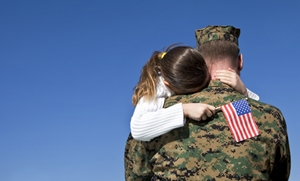For military families, video chat technology such as FaceTime and Skype have helped them through months or even years of a loved one's tour abroad. It can be difficult for families to adjust to a family member's deployment, especially when they may have young children at home. Being able to communicate "in person" on camera and more often has improved the quality of life for servicemembers and their families back home until they retire during life after service.
Keeping in touch
For the Danneker family, FaceTime is a daily ritual that helps keep JBER Technical Sgt. Shawn in touch with the home front. A member of the Air Force, Shawn is currently serving in Qatar as a station chief and lead firefighter at Al Udeid Air Base. With two young children at home, a toddler and newborn, Shawn's wife Britney believes that her husband isn't the only one serving his country.
"Because he's in the military, I'm almost in the military too," she told KTUU news, "I know he's serving and everything but we do our part at home. We may not be in a combat zone but we are holding down the fort here."
She looks forward to the day that he returns and can once again be a part of their children's lives. Until then, the family maintains a morning routine of video chatting Shawn to keep connected and involved in each other's lives, even when apart. These modern technologies have helped keep other military families sane until they can be reunited once again after a long tour.
Frequent communication is key
According to Foster's Daily Democrat, the physical separation that is frequent with military members has to be offset by a deep emotional connection with children while a parent is abroad. When families communicate frequently, it boosts the morale of the children and also the deployed family member. With this research in mind, Foster's recommends creating a communication plan before deployment to make sure that families stay involved in each other's lives.
When Ginger Munson and her children planned to contact her husband, Chief Warrant Officer 4 George Q. Munson, this past Father's Day, she began to recall the communication methods of the past, when she had to mail audiocassette tapes just so her husband could hear her voice during Desert Storm.
Nowadays, video chatting has made the distance between family members seem a lot shorter. Though emerging video chat technologies have helped families seem closer than ever, there are certain downsides of being so connected to the war zone. Munson reflects on a time that she overheard an exploding mortar during one phone call with her husband, followed by an abrupt goodbye, leaving her uncertain and worried.
However, the Democrat believes that frequent communication can strengthen families during deployment and keep them thriving when apart. Like anything, deployment is an adjustment before, during and after, but keeping communication open and constant will help to ease families back into the routine of having their loved ones around physically instead of just on the computer.

